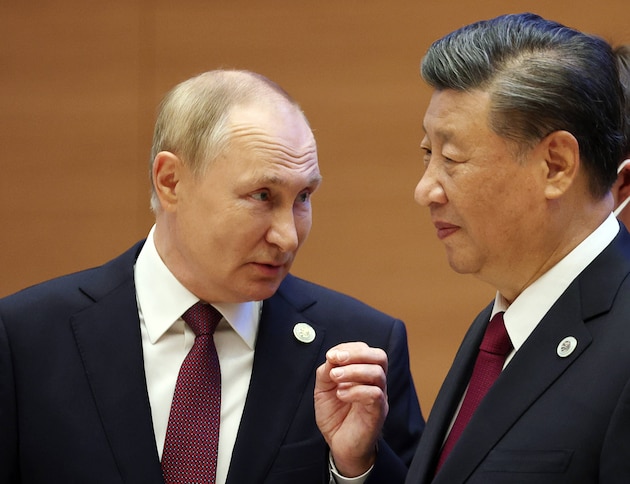Xi Jinping has been closely following the course of Putin’s invasion of Ukraine. He has made preparations – and in the event of an attack on Taiwan, unlike Russia, he would not run out of cartridges or drones.
The question of whether a Beijing attack on the island republic of Taiwan would be similar to Putin’s attack on Ukraine is on the minds of strategists, military officials and politicians around the world.
Is the Chinese army better prepared than the Russian one? In the event of an attack, can the Taiwanese defend themselves as well as the Ukrainian armed forces are doing right now? Can China’s leader Xi, unlike Kremlin dictator Putin, succeed in a “lightning war”?
In order to be able to answer these questions, remembering February 2022 is helpful. Because Putin’s attack was not a surprise, but had been prepared for weeks. The world watched as troops were deployed to the border with Ukraine, as the Kremlin’s rhetoric against the neighboring country intensified. Back then, in the capitals of the free world, it was believed that Putin was bluffing, that he wouldn’t actually pull off an attack. This misjudgment must not be repeated in the case of Taiwan.
If Beijing is really serious about its threat of war, it would mean weeks of preparation that would be noticed outside of the People’s Republic. The economy would have to be switched from Beijing to war production. Troop movements would be recognizable via satellite images. The attack would certainly not come as a surprise.
Xi Jinping, the commander-in-chief of his army (the Chinese army reports to the Communist Party and not the state), has been closely following the course of the Ukraine invasion. In September, his ally Putin had to show up and answer Xi’s “questions and concerns” about the failure of the Ukraine invasion. Beijing has thrown its weight behind it and supported Putin’s warmongering. Anything less than a victory for Putin would be an embarrassment and a loss of face for Xi.
Beijing knows why Putin hasn’t won the war so far: the defense readiness of the Ukrainian army and the civilian population, as well as the unity of the free world, ensured that the Kremlin’s aggression was successfully repelled.
Xi has therefore been busy for the past eleven months, speaking to co-dictators in Tehran and Pyongyang. The axis of evil from Moscow, via Beijing, North Korea and Iran is strengthened, weapons go back and forth between them. Beijing is ensnaring other autocracies like Saudi Arabia in order to coopt them up and give them the opportunity, at the crucial moment, to give up the alliance with Washington in favor of the People’s Republic. Xi Jinping would not run out of cartridges or drones in an attack on Taiwan.
In addition, Beijing is making massive efforts to arm itself against possible sanctions that an attack on Taiwan would certainly entail. Getting Saudi Arabia to settle oil deals with Beijing in Chinese currency rather than US dollars is part of the safeguards, as are contracts for gas and oil supplies with the Taliban (which are also to be paid for in Chinese currency). Even in Beijing, nobody believes that China’s economy can’t be curbed with sanctions anymore, because the economy is in a multiple crisis due to Xi’s ideological policies.
Red Alert: How China’s aggressive foreign policy in the Pacific is leading to a global war
Should the real estate sector, which accounts for around twenty percent of China’s economic output, actually collapse, economic growth continues to stagnate and even more loans granted by Beijing as part of its New Silk Road initiative fail, sanctions by the free world could endanger the Chinese economy and thus Xi’s autocracy and actually deal the deathblow to its nomenklatura. Xi definitely wants to be prepared for this.
China will, that much is certain, be better prepared for its war of aggression than Putin was. But in the end such a war is decided on the battlefield. And they are, in fact, fundamentally different.
Ukraine is the largest country in Europe and Taiwan is a small island. Landing on the coast would be far from easy for the Chinese navy and could end the invasion before it even begins. The Fall of the Armada in the 21st Century. But Beijing could easily isolate the island from the rest of the world. The blockade of Taiwan in the summer of 2022, after US politician Nancy Pelosi visited Taipei, gave a foretaste of this.
At the end of February 2022, the political leadership, the civilian population and the army of Ukraine, like those responsible for politics in the free world, were well ahead of Moscow. However, nobody can rest on their laurels. In order for Taiwan to remain a free country, anyone involved in a potential war or working to avoid it in the first place must be one step ahead of Beijing.
Alexander Görlach is Honorary Professor of Ethics at Leuphana University in Lüneburg and Senior Fellow at the Carnegie Council for Ethics in International Affairs in New York. After stints in Taiwan and Hong Kong, he has focused on the rise of China and what it means for East Asian democracies in particular. From 2009 to 2015, Alexander Görlach was also the publisher and editor-in-chief of the debate magazine The European, which he founded. Today he is a columnist and author for various media. He lives in New York and Berlin.








